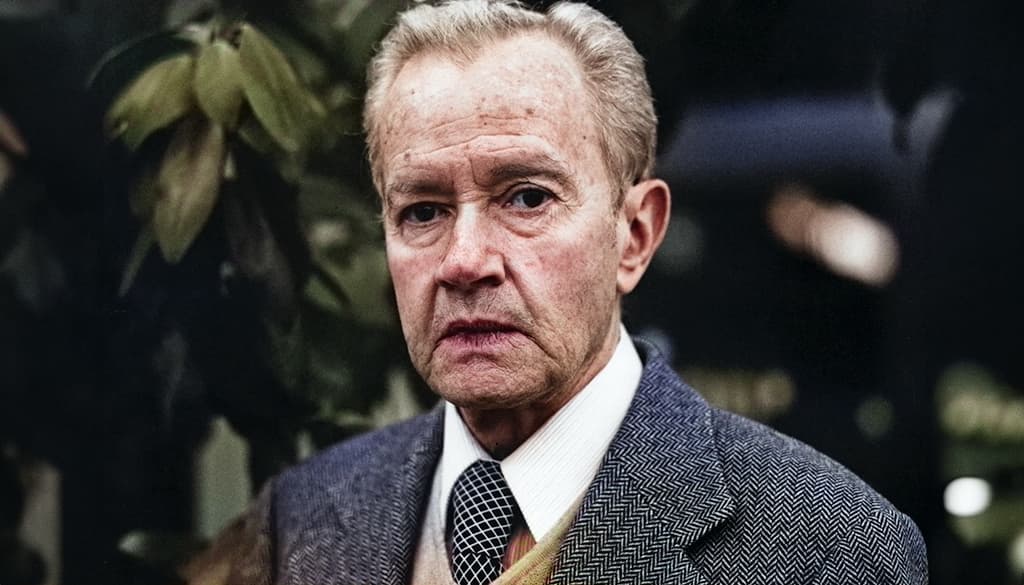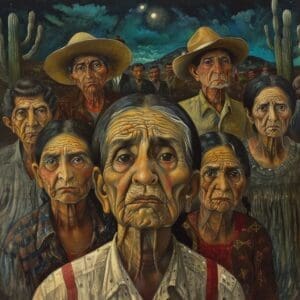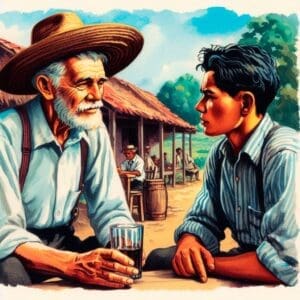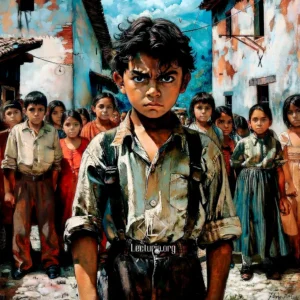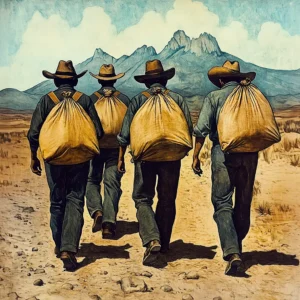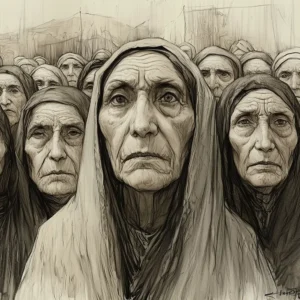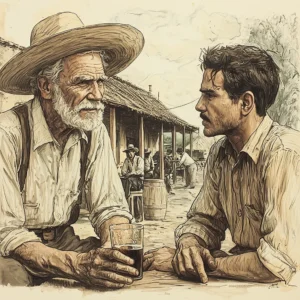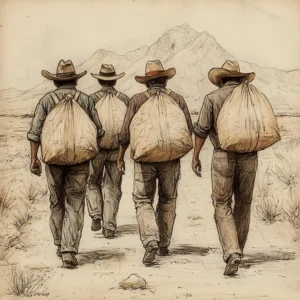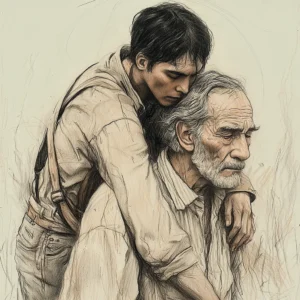Anuncio
Juan Rulfo: Luvina
In “Luvina,” a story published in El llano en llamas (1953), Juan Rulfo describes an inhospitable village lashed by the constant wind and the aridity of its surroundings. Through the memories of a man who narrates his experience in it, a place is presented where nature and time seem to have stopped, leaving only the echo of loneliness and sadness. The inhabitants, marked by resignation, live a hard and monotonous life tied to the barren land and the weight of their dead. In the middle of this desolate landscape, the narrator shares his melancholy reflection on the futile struggle against an implacable destiny.
Juan Rulfo: Paso del Norte
“Paso del Norte” is a story by Juan Rulfo published in 1953 in the El llano en llamas collection. It tells of a man’s determination to abandon his impoverished life in Mexico to seek better opportunities in El Norte. Despite the risks and family opposition, his desperation to escape misery drives him to set out on a dangerous journey, symbolizing the universal struggle for survival and the search for a dignified life.
Juan Rulfo: Remember
“Remember” (Acuérdate) is a short story by Juan Rulfo, published in 1953 in the collection El llano en llamas. It tells the story of Urbano Gómez, a cunning and resourceful boy raised in an environment marked by poverty and neighborhood gossip. Through memories of his childhood—his quarrelsome mother, his sister with hiccup attacks, his sales and petty tricks to earn a living—the story reconstructs the years in which Urbano roams the village, depicting a lively atmosphere in which his figure becomes inseparable from the daily hustle and bustle, until an embarrassing incident at school alters that routine forever.
Juan Rulfo: They Have Given Us the Land
They Have Given Us the Land (Nos han dado la tierra), a story by Juan Rulfo published in the magazine Pan in 1945, narrates the march of a group of peasants who are going to take possession of some land given to them by the government. Walking under a relentless sun, they reflect on the uselessness of the land assigned to them, where no seed can grow. The story describes their struggle and resignation in an inhospitable environment and the lack of hope for the future.
Juan Rulfo: Luvina. Summary and analysis
In “Luvina,” a story by Juan Rulfo, a man recounts his experience in a desolate village where nature and abandonment seem to have condemned its inhabitants to resignation and poverty. Through his memories, he describes an arid place lashed by a constant wind, where life seems to stand still and dreams fade away. Luvina is more than a physical space; it symbolizes helplessness and resistance to adversity. As he warns his interlocutor about what awaits him in that place, the narrator reveals how his time in Luvina transformed his illusions into disenchantment, offering a powerful portrait of the human struggle against destiny.
Juan Rulfo: Paso del Norte. Summary and analysis
Plot summary: in “Paso del Norte,” an impoverished man who has failed in his pig-selling business decides to emigrate to the North in search of work to feed his wife and five children. Before leaving, he visits his father to ask him to look after his family. Still, the conversation becomes an exchange of recriminations for a life of abandonment, poverty, and family resentment. The son finally sets off on his journey, and after being guided to the border by contacts, he tries to cross the river into the United States with other migrants, but they are ambushed by gunfire in the darkness. Although injured, he and his friend Estanislado manage to get out of the water, but the latter dies shortly afterward. The protagonist, battered and defeated, is returned to Mexico. Upon returning to the village, his father coldly informs him that his wife has left him for a muleteer and that he has sold the house to pay for the grandchildren’s expenses. Without a family or a home, the man resigns to start over and searches for his wife. The story portrays the desolation of the migrant, the failure of the dream of the North, and the breaking of family ties amid misery.
Juan Rulfo: They Have Given Us the Land. Summary and analysis
They Have Given Us the Land (Nos han dado la tierra), a story by Juan Rulfo published in El llano en llamas in 1953, narrates the journey of four peasants walking under a scorching sun after receiving land from the government. Across an arid and desolate landscape, the story shows their tiredness, silence, and uncertainty about the future that awaits them. With simple prose, Rulfo portrays the harshness of the countryside and the frustration of those who the system has forgotten. The story, full of symbolism and social criticism, exposes the silent struggle of the dispossessed in an unjust world.
Juan Rulfo: You Don’t Hear Dogs Barking. Summary and analysis
Juan Rulfo’s “You Don’t Hear Dogs Barking” (No oyes ladrar los perros) is a moving story about a father who carries his badly wounded son, Ignacio, on a grueling nighttime journey to the town of Tonaya to seek medical help. Through the father’s internal monologues, the problematic relationship between the two is revealed, marked by disappointment and resentment towards the son for his life of crime. However, driven by the memory of his late wife, the older man perseveres in his sacrifice, only to discover in the end that Ignacio has died along the way.
